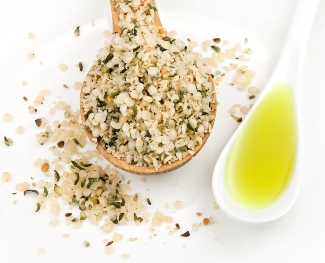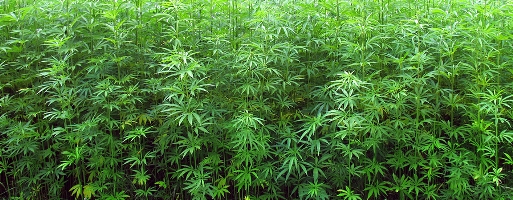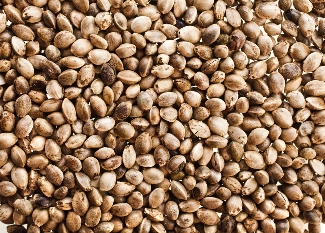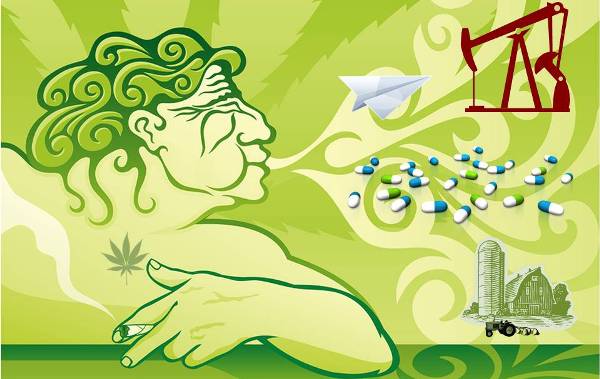Cannabis supporters loudly proclaim that there will be no deaths as a result of marijuana legalization, but this just isn’t true. The fact is that the casualties of marijuana legalization will be vast and prolonged, but they won’t be what you’re expecting. It won’t be people dying off; it will be industries. Marijuana is a powerful opponent to many industries, and some of the most at-risk industries are the same ones that sought to kill the plant off to begin with. But now marijuana is back, and she’s come to claim her victims.
Victim #1: Petroleum Industry

This is a death we can celebrate!
The petroleum industry has had a strangle-hold on the world for nearly the last century, but that reign is dying. Hemp oil is better than petroleum in virtually every way. Of course, the classic argument here is that hemp seed and marijuana seeds are not the same thing, but this just isn’t true. They are from slightly different varieties of the same plant, but if you press 1500 tons of hemp seeds and 1500 tons of marijuana seeds, you’re going to get roughly the same oil of approximately the same quality.
So here we have an organic plant that can produce a vast quantity of seeds when managed correctly, and these seeds can be used to produce everything petroleum produces: oils for beauty products, chemical processing, machinery lubricants, fuel & oil for virtually all types of automobiles, and practically anything else you can think of. If Big Petrol can do it, hemp can do it better, cheaper, cleaner and with fewer – if any – hazards and toxic byproducts.
The petroleum industry has significantly contributed to the toxic level of pollution in many parts of the world, and each day we’re still spewing tons more petroleum based chemicals, byproducts and other pollutants into the earth’s air, soil and water. Additionally, petroleum is based on a finite resource of fossil fuels that are rapidly dwindling. This is not a sustainable resource, and what little is left is being used to poison the planet we live on.
Conversely, hemp oil is 100% biodegradable and can be used to make extremely high quality products that would be difficult to distinguish from their petroleum-based counterparts.
The petroleum industry is already dying simply because of the fact that fossil fuels are disappearing. But with the liberation of the cannabis plant, its death will be greatly hastened. This is a death that we can celebrate, for it frees us from our horrifying addiction to costly and hazardous petroleum.
Victim #2: Paper Industry
The paper industry has been nearly as bad for our collective health as the petroleum industry. This industry has completely wiped out most of the world’s old growth and primary forests while dumping unknowable amounts of toxic byproducts and chemicals into our rivers, lakes and oceans. This has also destroyed millions of acres of habitat – much of it in places where some species of animals and plants are already in danger of decline and extinction.

But the wood paper industry will soon be dead. That’s because hemp is a far better resource that we can sustain indefinitely with minimal impact on the environment. Not to mention, hemp produces better quality paper. Here are a few more reasons why, when fully liberated, hemp is going to straight-up murder the paper industry:
- Toxic chemicals used to bleach wood paper are not required for hemp.
- Wood paper has an average span of 54 years of use in good conditions. Hemp paper lasts for 300, 400 years or longer.
- Hemp paper can be recycled more than twice the number of times that wood paper can be recycled.
- An acre of hemp can produce 4 times the amount of paper as an acre of trees.
- An acre of hemp can be raised and harvested 2-3 times in a single year, while an acre of trees can take years to grow.
- Hemp processes more than 4 times the amount of carbon dioxide as trees
The reality is that the paper industry is the unwanted newcomer here. Displacing hemp paper after hundreds of years of use, wood paper has had a significant negative impact on the earth in the scant 100 years since its truly mainstream acceptance. So when hemp is free from the political malarkey confounding it today, its slaughter of the wood paper industry will in actuality be the restoration of hemp paper’s rightful place in our society.
Victim #3: Textile Industry
For thousands of years, hemp was the mainstay of the textile industry. Everything from sails and rigging to clothing and bedding were made from hemp fiber. But in the last century, cotton quickly replaced hemp thanks to advancements in the way the material was processed, as well as extensive lobbying on the part of the cotton industry. But when it comes to a battle between hemp and cotton fiber materials, cotton doesn’t stand a chance. Here’s why:
- Cotton requires twice the land that hemp does to produce one ton of textile products
- Cotton requires twice as much water as an equivalent crop of hemp, and 4 times as much water during processing
- Hemp produces up to 250% more fiber than cotton
- Cotton requires a vast amount of pesticides and herbicides to grow, whereas hemp requires none
- Hemp clothing is more durable and longer-lasting than cotton
Of course, there are plenty of other types of materials used in textile production today, but the bulk of it is cotton based. When hemp is allowed back on the scene again, this will quickly change and the textile industry will die and be reborn again as it once was – with hemp at the top.
 Victim #4: Pharmaceutical Industry
Victim #4: Pharmaceutical Industry
Marijuana is already poised to create a whole new class of organic pain killers, appetite stimulants, sedatives, cancer treatments and many more pharmaceutical uses. This doesn’t even take into consideration that oil from hemp seeds will almost certainly be used in the production of hundreds of synthetic drugs that traditionally have relied on petroleum based production materials.
Cannabis legalization and subsequent research will radically change the pharmaceutical industry, but it won’t outright kill it. However, it will probably kill off some of the most dangerous types of pharmaceuticals, like the painkillers we’re so addicted to, and behavioral and emotional drugs like Ritalin, Valium, Seroquel, Prozac and many others. And if research proves that compounds found in marijuana can cure or prevent cancer, you can bet that massive pharmaceutical entities will indeed perish.
Victim #5: Agricultural Industries
Widely hailed as the most nutritionally complete food source in the world, cannabis seeds can feed livestock in ways that traditional grains cannot. In fact, much of the deforestation of this earth has occurred and continues to occur in order to raise enough grain crops for cattle that ultimately make it into your fast food burger. However, it’s not just the seed that makes an excellent animal feed; hemp hurds, hemp oil and whole hemp plants can be offered to different types of livestock, ruminants and poultry as an efficient, inexpensive and highly nutritious feed.
The death of the grain-based animal feed industry won’t come easy, but it will come. However, perhaps even more significant than this agricultural death is the death of the corn industry that will result when hemp is freed from political prison. Corn is used in many products from cereals and sweeteners to pet food and convenience store snacks. But one of the most prolific uses of this crop is for the production of ethanol fuel; something that hemp does a much better job at producing more efficiently.
this agricultural death is the death of the corn industry that will result when hemp is freed from political prison. Corn is used in many products from cereals and sweeteners to pet food and convenience store snacks. But one of the most prolific uses of this crop is for the production of ethanol fuel; something that hemp does a much better job at producing more efficiently.
In fact, in a 2008 paper for the University of Washington Department of Biology titled “The Case for Hemp as Biofuel,” Kimball Christensen and Andrew Smith make the following conclusion;
Hemp exhibits far superior ethanol yields per unit biomass compared to Zea mays (Corn) or Panicum virgatum (Switchgrass), which are currently the two most supported biofuel cultivars by the United States government.
If this proves true, then we may witness the death of the corn and other agricultural industries as we know them, and they’ll get nothing but a flippant “good riddance” from this author.
Conclusion
The only problem with these arguments is that we only know a little about how useful the cannabis plant really is. Once marijuana is more widely accepted, the amount of research and technology that has gone into other materials – such as cotton, corn, wood paper and petroleum – can be applied to this plant, advancing it significantly in short order. But for now cannabis is largely stuck back in the days before the Marihuana Tax Act, with no significant advancement or technologies applied to it since the 1930’s. Even in this state, it’s still a far better option than what the industries listed here have provided us with. So just imagine what will happen when we are finally able to fully study and develop this plant…
These are the first 5 major industries that I think are going to die or at least have their limbs cut off when marijuana is fully legalized. Can you think of more?
References:
Becca Wolford Everything Petroleum Does, Hemp Does Better
Waking Times December 28, 2012 http://www.wakingtimes.com/2012/12/28/everything-petroleum-does-hemp-does-better/
Hempcar Transamerica Pollution: Petrol vs Hemp http://www.hempcar.org/petvshemp.shtml
Jeremy Briggs Can hemp replace trees as a major source for paper? Hemphasis Magazine, Fall 2004 http://www.hemphasis.net/Paper/paper_files/hempvtree.htm
Industrial Hemp Facts Hemp Technologies http://www.hemp-technologies.com/page33/page33.html
Brian Palmer High on Environmentalism: Can hemp clothing save the planet? Slate.com APRIL 12 2011 http://www.slate.com/articles/health_and_science/the_green_lantern/2011/04/high_on_environmentalism.html
Joe Martino Hemp vs Cotton: The Ultimate Showdown Collective Evolution July 17, 2013 http://www.collective-evolution.com/2013/07/17/hemp-vs-cotton-the-ultimate-showdown/
EFSA Journal Scientific Opinion on the safety of hemp (Cannabis genus) for use as animal feed EFSA Journal 2011;9(3):2011 [41 pp.]. doi:10.2903/j.efsa.2011.2011 http://www.efsa.europa.eu/en/efsajournal/pub/2011.htm
Kimball Christensen and Andrew Smith The Case for Hemp as a Biofuel University of Washington Department of Biology 2008 http://www.votehemp.com/PDF/The_Case_for_Hemp_as_a_Biofuel2008.pdf
- Barcelona Cannabis Club Review: Green Age - March 23, 2022
- Things to do after Smoking Weed in Barcelona - March 2, 2022
- 9 Things You Need to Know about Cannabis Clubs in Madrid - February 15, 2022



11 thoughts on “The Real Casualties of Marijuana Legalization”
are these people saying that there company’s or whatever is more important than the lives of the babies with epilepsy?
The article title is The Real Casualties of Marijuana Legalization. Casualties means “deaths.” Marijuana legalization will destroy or kill the companies/industries discussed in the article. Marijuana legalization will help infants, children and adults with epilepsy. So the answer to your question is a resounding NO.
regardless. it should be legal. why cant those company’s just use marijuana like there competition?
You ask me a question and when I reply you tell me “regardless?”
also why is it that the old company’s should be the ones to succeed and the new ones fail? the new ones have worked just as hard to get where they are. if the company’s listed above wants to succeed then that should offer better deals.
You need to actually read this article. The piece does not discuss any companies at all; it discusses major INDUSTRIES that were part of the marijuana prohibition movement in the first place. It does not AT ALL say that these industries will succeed; it says that with the coming marijuana legalization, these old outdated, corrupt and wasteful industries will DIE. The “new companies” (industries) are still being born and their success is dependent on how they conduct their operations in this new environment where marijuana is legal. Please, READ the article.
Russ, may I reblog:
The Real Casualties of Marijuana Legalizatio?
If yes, how do I reblog your post? I don’t see any reblog button.
Hey Rob; of course! I’m not familiar with a reblog button, unfortunately… But you can post it however you wish as long as it links back to the article. There is an RSS feed in the upper right corner; not sure if that’s what you mean?
Thank you Russ. Excellent article. Take a look my writing on cannabis on:
http://renovatingyourmind.com/2014/03/03/future-shock-of-exponential-changes-that-will-rock-our-world/
Thanks, Rob. I did pop over and read your article and loved it, so thanks for sharing! We’ve got a long way to go when it comes to changing the status quo of cannabis, but as you mentioned, it’s happening quickly now and we need to make sure people don’t lose their heads in the new reality to come.
Agreed Russ. Keep up the great work.